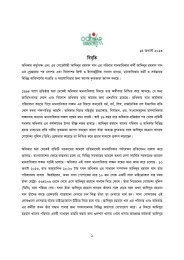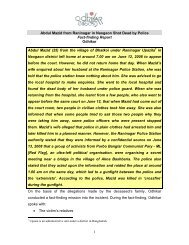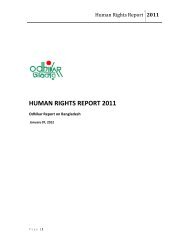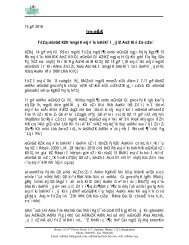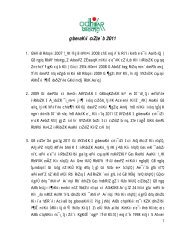Please - Odhikar
Please - Odhikar
Please - Odhikar
You also want an ePaper? Increase the reach of your titles
YUMPU automatically turns print PDFs into web optimized ePapers that Google loves.
Farhad Mazhar: Some of the suggestions coming from a Justice of the Supreme Court are very<br />
important. The SAARC Convention is limited within the issue of prostitution. However, women<br />
and children are not only trafficking for prostitution, they are trafficked for forced marriage,<br />
bonded labor and to become camel jockeys and many other reasons. The capacity of the state to<br />
recreate the event before the living presence of the law is vital. The capacity is lacking in all the<br />
SAARC countries.<br />
ASM Shahjahan:I thank <strong>Odhikar</strong> and AED for discovering the victims. We deal with the<br />
judiciary system, the crime, and the case but hardly with the individual victim. This topic is<br />
fundamentally humanistic and it comes from a commitment of social justice. We have discussed<br />
about the protection but I want to suggest some points relating to the treatment the victims and<br />
witnesses get from the criminal justice system, from the media, from the court and other<br />
associated people. If they are not given protection, they get threats, insults and harassment from<br />
the perpetrator, his family or his sympathisers. We have been talking about recorded victims. But<br />
the unrecorded victims are many fold and they do not refrain from seeking justice only because<br />
of the fear of reprisal. Becoming a victim again is the fear they experience continuously. Many<br />
crimes remain unreported. What is the position of a victim in the justice system? Victims'<br />
interaction with the police, the prosecution, with the court? And whose interest does the law<br />
serve? Whose interest does the criminal justice system serve? Whose interest does the criminal<br />
government serve? Do they serve the need and want of the victims? Is the victim only the<br />
victim? You know those who have been traumatized become the victim; those who are<br />
dependent upon the victim are also victims. And the victims are belittled in a word or<br />
environment where might is right. Crimes are interpreted in our law as attacks against the state.<br />
And state becomes the party against the accused or offender. In this situation, from the very<br />
beginning the state become primary and the victim becomes secondary. We often take into<br />
consideration the relationship between the offender and the victim in cases of domestic violence.<br />
Parasitical relationship, exploitative relationship, destructive relationship, oppressive<br />
relationship and also street crimes are issues that also need to be discussed. The culture of<br />
blaming the victim also needs to be seriously addressed. Have we found out who are blaming the<br />
victims? Why victims are being harassed in many places and by whom? What it means to be a<br />
victim? How soon are victims are forgotten? Have we kept a list of the victims? Do we<br />
remember them? In what extend his statements or comments are considered? The police often<br />
give empty promises of protection where the victims are given protection for two days. On the<br />
third day the protection is withdrawn. What is needed is a permanent victim and witness<br />
protection squad, quick response, investigation of the threat and its punishment should be<br />
exemplary. The relationship between a victim and the defense lawyer is far from amicable. Fear<br />
of harassment or danger stops the witness from giving statements and creates a rift between him<br />
and the victim. Victims of yesterday, we are sorry, we apologize to you. Victims of today, we<br />
promise you, empty promises and victims of tomorrow, let us do something concrete for you. In<br />
a situation like this, the victims say, "I don't need any more harassment, save me from your dog."<br />
Second Working Session<br />
Presided by: Syed Fahim Munaim, Managing Editor, The Daily Star<br />
Country Paper Presentation:<br />
1. Mr. Subodh Raj Pyakurel, Chairperson INSEC and Board Member, SAFHR, Nepal<br />
2. Mr. Rukshan Fernando, Sri Lanka<br />
Report 2005<br />
71




